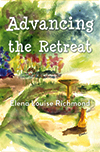Swerving and Centering
Here in Seattle we have had a week of lovely early summer weather. It was warm enough to sit under my magnificent 40 year old lilac trees at six in the morning, drink tea and read. I was so engrossed in the book by Stephen Greenblatt called The Swerve that I read it straight through, started over and read it again. It’s the story of a poem called De rerum natura (On the Nature of Things ) by a Roman named Lucretius Carus (99-55 BCE) who put in verse the philosophy of Epicurus (341-270 BCE). Now I am working my way through the actual poem. It’s going to take more than a week of nice weather because it’s 7800 lines. But I’m hooked.
I will leave it to scholars to squabble about the poet, the philosopher, the physics involved, and the author of The Swerve. Me, I had an Epicurean experience just from reading the book. Sitting under my lilacs watching hummingbirds zipping around the branches and my cats quivering with all their senses, it was easy to believe that I am made of the same substance as the world around me. And that is the core of what Epicurus and Lucretius have to say.
“The stuff of the universe, Lucretius proposed, is an infinite number of atoms moving randomly through space, like dust motes in a sunbeam, colliding, hooking together, forming complex structures, breaking apart again, in a ceaseless process of creation and destruction.” (Stephen Greenblatt,The Swerve)
This is not a startling idea nowadays but it was first proposed as a philosophy in classical Greece long before modern day physicists got a hold of it. Having no science/math background I had only encountered the idea from studying eastern religions. Its logical conclusion is that when we die, we cease to be anything other than the particles of which we are made.
We may be reassured that in our Death
We have no cause for fear, we cannot be
Wretched in non-existence.
Death alone has immortality, and takes away
Our mortal life. It does not matter a bit
If once we lived before.
(From De rerum natura , Rolfe Humphries translation)
When I read these words something happened that I was not expecting: warmth, comfort and relief washed through me. These were ideas that felt at home in my internal world. This doesn’t mean I have now become a complete Epicurean. It’s just that in the surprising appeal of this idea I learned something new about myself: that I wouldn’t mind if when I died, that was it for me. What was once Me might join the dance of motes in the sunbeam and I would simply cease.
Stephen Greenblatt in his preface—which I’m glad I read because I hardly ever read prefaces—says that the poem struck a deep chord in him because at its core it is a “profound, therapeutic meditation on the fear of death, and that fear dominated my entire childhood.” He goes on to say that “art always penetrates the particular fissures of one’s own psychic life.”
The same could be said about religion (and by religion I mean any particular structure and language whereby one can apprehend the spiritual dimension). Religion and art affect us where we are most vulnerable and idiosyncratic which is why it is so important to listen to each other and let each other be. Interfering with other people’s processes, demanding they believe something they simply do not believe is like cleaving a sculpture at a crack in its surface.
I learned something else in this remarkable book, something I might already have known if I had paid better attention to classics lectures in college. I learned about Ciceronian conversation: the “discussion itself is what most matters, the fact that we can reason together easily, with a blend of wit and seriousness. . . always allowing room for alternative views.”
There is arrogance, indignation and narcissistic rage in both public and private interaction these days. We think our ideas are correct and anyone who disagrees is incorrect. We are out to convert anyone who disagrees with us and have no use for anyone who doesn’t succumb to our arguments. We are afraid of looking stupid. We are afraid of what might fracture if we were open to the influence of The Other. There’s a good reason for that fear. We don’t expose our vulnerabilities when the atmosphere is hostile.
When I was in analysis and would practically levitate off the couch with anxiety over something my analyst said, he sometimes reminded me, “These are just thoughts. We’re just talking here. That’s all.”
I am as bad as anyone at staying detached and curious, and I’d like to get better. I crave conversation. I want to treat ideas like motes in a sunbeam. To that end I started a page on Facebook called Civilities. If you’re interested, go have a look. https://www.facebook.com/Civilities Treat me like a shut-in who just wants someone to talk to.
 RSS Feed
RSS Feed










